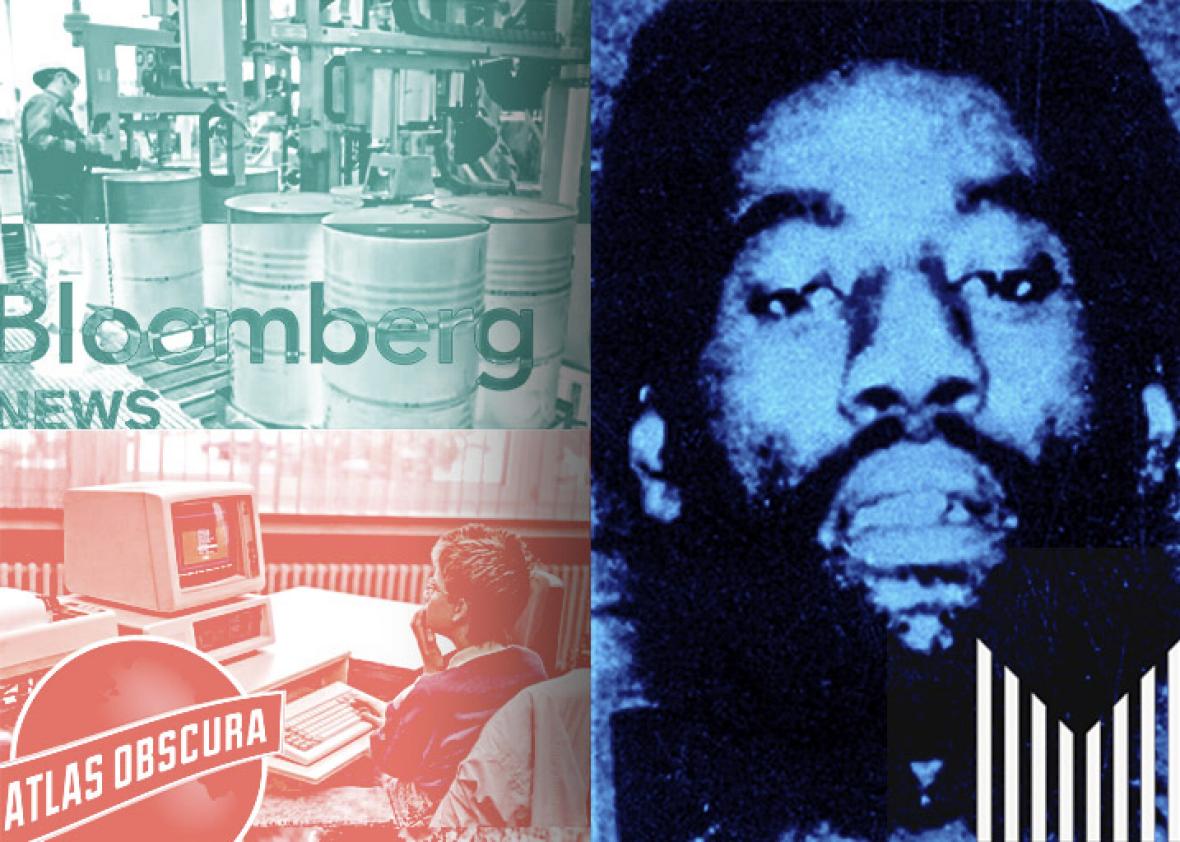The Reading List
Stories we liked from around the Web for the week of Nov. 2.

Photo illustration by Slate. Images and logos via Bloomberg News, the Marshall Project, and Atlas Obscura.
Reading List is a curated list of great pieces from around the Web from Slate editors and writers, just for Slate Plus members. Here are our favorite stories for the week of Nov. 2:
“That Time I Tried to Buy an Actual Barrel of Crude Oil” by Tracy Alloway, Bloomberg
For a long while now, the oil market has been in a state of “contango,” which is an exciting, dancey-sounding word for a slightly dull concept. However, it’s also the impetus for this delightful piece by Bloomberg Markets editor Tracy Alloway about her slightly mad quest to buy an actual, physical barrel of oil. No spoilers on whether she succeeds. Just read and enjoy. It’s like a spoonful of sugar to make your crude market analysis go down. —Jordan Weissmann, senior business and economics correspondent
“Willie Horton Revisited” by Beth Schwartzapfel and Bill Keller, Marshall Project
There are some historical figures whose names have become so synonymous with a concept or an idea that we forget they belonged to real people. Willie Horton, who was convicted of committing a gruesome rape while out on furlough from prison, is one of them: In the decades that have passed since George H.W. Bush’s presidential campaign used Horton as a symbol for the perils of electing soft-on-crime Democrats, his name has become shorthand for the political risks that come with advocating for making the criminal justice system less harsh. In this extraordinary story from the Marshall Project, which was published in May, just as the federal government was preparing for the early release of thousands of drug offenders, we hear from Horton himself. There are even recordings of him talking from prison embedded in the text, which has the overall effect of blowing the dust off his story and makes it real again. —Leon Neyfakh, staff writer
“Grantland and the (Surprising) Future of Publishing” by Ben Thompson, Stratechery
Thompson made a counter-intuitive but totally compelling case for what we can learn from the death of Grantland: If it’s hard to monetize great writing, we should just stop trying. Instead, we can use great writing as a gateway to drive readers to the more monetizable businesses like television shows, movies, and podcasts. —Nicholas Quah, audience development
And from Twitter:
— “Will reducing school suspensions help low-income children succeed?” Reihan Salam liked Michael Petrilli’s skeptical answer.
—Nora Caplan-Bricker “really loved” this Quartz story about the sexist origins of kitchen design specs. “And here’s an interesting counterpoint!” replied Rachael Larimore.
—David Plotz pointed out this Atlas Obscura story about “the first Internet supervillain, the Morris Worm, which shut down 10 percent of the entire Internet.”
—Jamelle Bouie thinks the next GOP debate should feature more “softball” questions: “I hope moderators at the next debates take Matt’s advice here.”
—David Auerbach and Faith Smith both recommended this essay by a former Twitter worker about the challenge of making the tech industry more diverse.
—Quoting from “The Poetry of Bad Weather” by Debora Greger, Laura Helmuth asked: “Why did the great dead poets all live north of us? Was there nothing to do all winter but pine for better weather?”